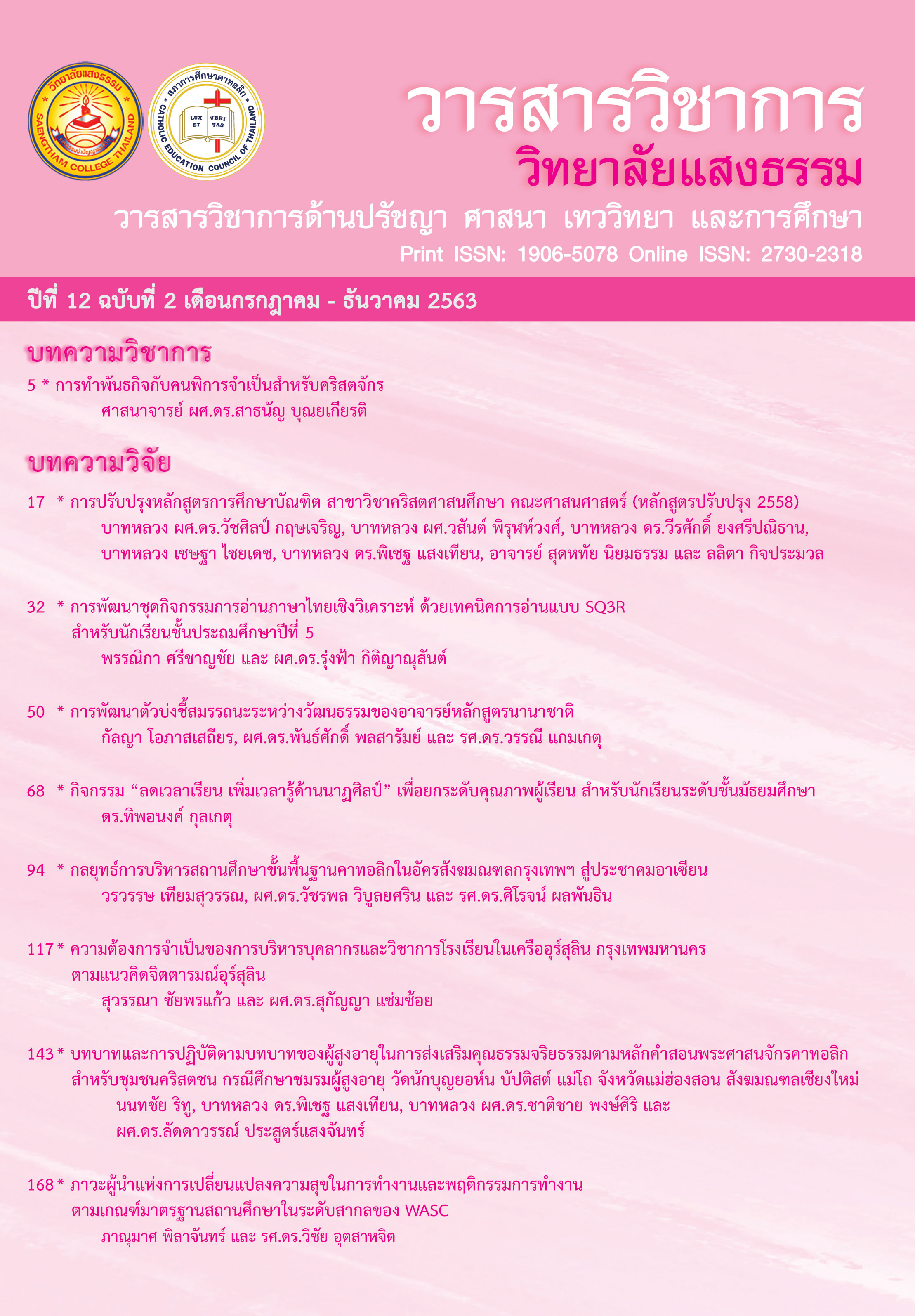Transformational Leadership, Happiness at Work, and Work Behavior According to International Education Institution Standard of WASC.
Main Article Content
Abstract
The purpose of this research was to examine the relation among and the prediction of Transformational Leadership and Happiness at Work on Work Behavior According to International Education Institution Standard of WASC. The sample group was 244 employees which were Faculty and Classified Staff, from Ruamrudee International School. The data were collected using research instruments including; General information about the respondent, Leadership Style (The School Administrators), Happinometer: Happiness You Can Self-Measure, and Work Behavior According to International Education Institution Standard of WASC. Results revealed that there were positive relationships between Transformational Leadership and Happiness at Work, Transformational Leadership and Work Behavior According to International Education Institution Standard of WASC, Happiness at Work and Work Behavior According to International Education Institution Standard of WASC. And also, Work Behavior According to International Education Institution Standard of WASC could be predicted by Transformational Leadership and Happiness at Work. Results found in this study recommended that the school should implement these following processes; planning all working processes following the school vision and mission, finding multiple inside and outside communication way for all staff to share their knowledge among themselves, providing professional development for all staff, making sure that all school stakeholders involve in a development of the school, and paying attention to the happiness of all staff. Finally, the recommendation for further study was to find development methods suitable for developing the sample organization.
Article Details
- The academic and research articles, as well as the content and opinions expressed therein, published in Saengtham College Journal are solely the responsibility of the respective author(s).
- Articles published in Saengtham College Journal are the property of Saengtham College. Reproduction, modification, or dissemination of all or part of the content in any form without written permission from Saengtham College is prohibited.
- Articles published in Saengtham College Journal are protected under the Copyright Act.
References
กรมวิชาการ. (2541). รายงานการวิจัยการจัดการศึกษา ระดับประถมศึกษา มัธยม และอาชีวศึกษาของไทยในทศวรรษหน้าที่สอดคล้องกับการเปลี่ยนแปลงของสังคม. กรุงเทพมหานคร: กองวิจัยทางการศึกษา กระทรวงศึกษาธิการ.
กาญจนา ตั้งชลทิพย์, ศิรินันท์ กิตติสุขสถิต, สุภรต์ จรัสสิทธิ์, พอตา บุนยตีรณะ และวรรณภา อารีย์. (2553). การพัฒนาระบบเงินเดือนค่าตอบแทนสิ่งจูงใจและคุณภาพชีวิตข้าราชการ: การศึกษาเพื่อพัฒนาเกณฑ์มาตรฐานชี้วัดคุณภาพชีวิตของข้าราชการ. รายงานวิจัย. ม.ป.ท.
จงจิต เลิศวิบูลย์มงคล. (2547). ความสัมพันธ์ระหว่าง ปัจจัยส่วนบุคคล การได้รับการเสริมสร้างพลังอํานาจในงานแรงจูงใจใฝ่สัมฤทธิ์กับความสุขในการทํางานของพยาบาลประจําการโรงพยาบาลมหาวิทยาลัยของรัฐ. (วิทยานิพนธ์ปริญญามหาบัณฑิต). จุฬาลงกรณ์มหาวิทยาลัย.
จุฑามาศ แก้วพิจิต, วิชัย อุตสาหจิต, และสมบัติ กุสุมาวลี. (2554). ความสุขหลากหายมุมมองด้วย HOME โมเดล. นนทบุรี: สองขารีเอชั่น.
เฉลา ระโหฐาน. (2553). การศึกษาความสัมพันธ์ระหว่างภาวะผู้นำการเปลี่ยนแปลงของผู้บริหารสถานศึกษาและประสิทธิผลการบริหารงานของสถานศึกษาขั้นพื้นฐาน ในสังกัดสำนักงานเขตพื้นที่การศึกษาชลบุรี เขต 2. (วิทยานิพนธ์ปริญญา). มหาวิทยาลัยราชภัฏราชนครินทร์.
ชื่นฤทัย กาญจนะจิตรา, กาญจนา ตั้งชลทิพย์, ศิรินันท์ กิตติสุขสถิต, ปังปอนด์ รักอำนวยกิจ, สุภรต์ จรัสสิทธิ์, พอตา บุนยตีรณะ และวรรณภา อารีย์. (2551). คุณภาพชีวิตคนทำงานในภาคอุตสาหกรรมและภาคบริการ. นครปฐม: สถาบันวิจัยประชากรและสังคม มหาวิทยาลัยมหิดล.
บุษยา วีรกุล. (2558). ภาวะผู้นำ. กรุงเทพมหานคร: สถาบันบัณฑิตพัฒนบริหารศาสตร์.
พระบาทสมเด็จพระปรมินทรมหาภูมิพลอดุลยเดช. (2523). พระบรมราโชวาท พระราชทานแก่นักศึกษามหาวิทยาลัยศรีนครินทรวิโรฒ วิทยาเขตสงขลา. ม.ป.ท.
ลัทธิกาล ศรีวะรมย์. (2538). คัมภีร์การจัดการกับลูกน้องและเจ้านายเพื่อให้เป็นนักบริหารเกณฑ์ประสิทธิผล. กรุงเทพมหานคร: คู่แข่งบุคส์.
วิชัย อุตสาหจิต และลัญชกร คําศรี. (2554). ถอดรหัสผู้นํา: มุมมองภาคปฏิบัติบนฐานคิด เชิงทฤษฎี. กรุงเทพมหานคร: จุฬาลงกรณ์มหาวิทยาลัย.
ศิรินันท์ กิตติสุขสถิต, กาญจนา ตั้งชลทิพย์, สุภรต์ จรัสสิทธิ์, เฉลิมพล สายประเสริฐ, พอตา บุณยตีรณะ และวรรณณภา อารีย์. (2555). คู่มือการวัดความสุขด้วยตนเอง. นครปฐม: สถาบันวิจัยประชากรและสังคม มหาวิทยาลัยมหิดล.
สิรินทร แซ่ฉั่ว. (2553). ความสุขในการทํางานของบุคลากรเชิงสร้างสรรค์: กรณีศึกษาอุตสาหกรรมเชิงสร้างสรรค์กลุ่มสื่อและกลุ่มงานสร้างสรรค์เพื่อการใช้งาน. (วิทยานิพนธ์ปริญญามหาบัณฑิต). สถาบันบัณฑิตพัฒนบริหารศาสตร์.
Accrediting Commission for Schools Western Association of Schools and Colleges. (2016). Focus on Learning The Accreditation Manual. California: California Department of Education.
Bass, B.M., and Avolio, B.J. (1994). Improving Organizational Effectiveness Through Transformational Leadership. Thousand Oaks, Calif.: Sage.
Bay Area Web Solutions. (2015). Western Association of Schools and Colleges. [Online]. from: http://www.acswasc.org. (Retrieved: November 30, 2015).
Burns, J.M. (1978). Leadership. New York: Harper & Row.
Diener, E. (2003). Recent Finding on Subject Well-Being. [Online]. from: http://goo.gl/egfLG. (Retrieved: November 16,2015).
Manion, J. (2003). Joy at Work. Creating a Positive Workplace. Journal of Nursing Administration. 33(12): 652-659.
Myers, D.G., & Diener, E. (1995). Who Is Happy?. Psychological Science. Vol 6(1): 1017.
Ozaralli, N. (2003). Effects of transformational leadership on empowerment and team effectiveness. Leadership and Organization Development Journal. 24(6): 335- 344.
Recruitment Handbook 2017-2018. (2016). Bangkok: Ruamrudee International School.
Yukl, G. (2006). Leadership in Organization. (6th, Ed.). Englewood Cliffs, NJ: Prentice-Hall.


